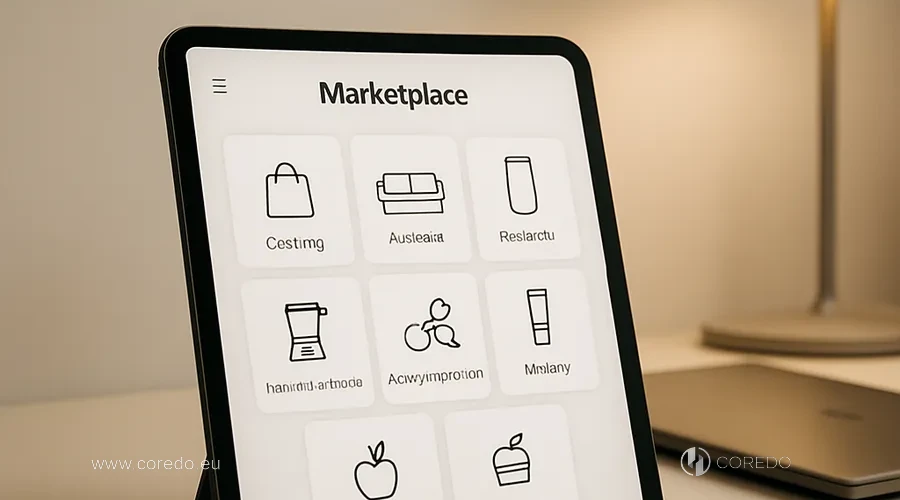In 2025 the Swiss online marketplace market demonstrates dynamics capable of surprising even experienced analysts: according to Statista, the country’s e-commerce volume exceeded 15 billion CHF, and the average basket per shopper is one of the highest in Europe.
As the founder of COREDO, I face questions every day about how to launch a marketplace in the Swiss market, which technologies and business models will be relevant in 2025, and what truly works to increase ROI and customer trust. In this article I not only analyze trends but share practical strategies that the COREDO team implemented for clients from the EU, Asia and the CIS, helping them not only comply with strict requirements but also use them as a competitive advantage. If you want to understand how to manage risks, automate processes, implement AI and no-code solutions, and most importantly — build a sustainable and profitable e-commerce business in Switzerland, I recommend reading the article to the end. Here you will find not only answers but tools for real growth.
The Swiss online marketplaces market in 2025

The Swiss online marketplaces market is characterized by a high degree of maturity, yet still retains potential for further growth through digital transformation and the adoption of innovations. According to the latest McKinsey report, e-commerce growth rates in the country consistently exceed 7% per year, and the penetration of marketplace platforms in the Food & Drink, Apparel and Home & Garden segments continues to increase. A feature of the Swiss market is the high concentration of major players such as Galaxus, ImmoScout24 and AutoScout24 (Swiss Marketplace Group), as well as an emphasis on service quality and transaction security.
Unlike other countries in the DACH region, Switzerland demonstrates a more conservative approach to digital commerce: new business models are adopted more slowly here, but trust in platforms is higher and requirements for localization and compliance with standards are stricter. For example, in the Apparel segment there is growing demand for recommerce and sustainability, and in Food & Drink, for transparency of product origin and eco-friendly logistics. COREDO’s practice confirms: successful marketplaces in Switzerland build their strategy on deep integration with local payment systems, automation of catalog management and personalization of the user experience.
Analysis of consumer preferences and behavior
The Swiss consumer is characterized by high purchasing power, yet tends toward caution and careful analysis of offers. Research shows that the share of mobile payments in the e-commerce structure is rapidly growing: in 2025 more than 60% of marketplace transactions are made via mobile devices, and the popularity of digital wallets (for example, Twint) surpasses traditional bank cards. Payment localization becomes a key factor: marketplaces integrating local payment methods record conversion growth of up to 20% compared to those limited to international solutions.
The impact of mobile payments on buyer behavior is clear: the share of impulse purchases is growing, and requirements for transaction speed and security are becoming decisive when choosing a platform.
The impact of digital transformation on e-commerce
Digital transformation in Swiss e-commerce is manifested primarily in content automation and catalog management. A solution developed at COREDO for the Apparel segment automated product updates using AI algorithms, reducing operating costs by 30% and accelerating the market launch of new collections. The adoption of no-code platforms is becoming a standard for rapid marketplace scaling, especially when flexible adaptation to the requirements of different segments and locales is necessary.
AI and no-code solutions not only optimize marketplace catalog management, but also personalize offers, analyze buyer behavior in real time, and automate the processing of reviews and returns. COREDO’s practice shows: companies investing in digital commerce and e-commerce automation achieve higher operational efficiency and adapt more quickly to market changes.
Legal and tax aspects of marketplaces in Switzerland

Switzerland’s legal environment imposes special requirements on online marketplaces related to personal data protection, compliance with AML (Anti-Money Laundering) standards and strict tax regulation. For a successful launch and scaling of a platform it is necessary to consider not only national legislation but also EU norms, especially when it comes to cross-border trade.
Special attention should be paid to taxation issues: in 2025 Swiss regulators tightened control over the correctness of VAT calculation for foreign sellers, as well as for protransparency of financial flows on marketplaces. COREDO’s experience in supporting clients from the EU and Asia confirms: a competent tax structure and timely compliance with regulators’ requirements make it possible to avoid fines and account blocks, and also increase trust from banks and payment systems.
AML consulting becomes an integral part of comprehensive business support: marketplaces are required to implement KYC procedures (Know Your Customer), transaction monitoring and automated systems for detecting suspicious operations. Solutions developed by COREDO make it possible to integrate AML procedures into marketplace business processes without harming UX and service speed.
Risk management and transaction security
Buyers’ trust in marketplaces in Switzerland is largely determined by the level of transaction security and the transparency of personal data processing. Best practices in risk management include regular IT infrastructure audits, the implementation of multi-factor authentication, and the use of AI to detect fraudulent schemes in real time.
Innovation in e‑commerce is not only new payment methods, but also modern cybersecurity tools that comply with GDPR standards and Swiss legislation.
Technologies and automation of marketplaces 2025

technological progress determines the competitiveness of marketplaces: AI and automation are becoming key growth drivers. Product information management (PIM) with the help of artificial intelligence allows centralized control over content quality and relevance, and integration with ERP and CRM systems ensures end-to-end transparency of business processes.
No-code solutions open up opportunities for rapid prototyping of new features and scaling the platform without significant development costs. Implementing e-commerce automation becomes especially relevant for marketplaces operating in multiple segments and regions: such platforms adapt faster to changes in demand and local market requirements.
Automation of catalog and content management
Catalog management automation is one of the key growth factors for marketplaces in Switzerland. Using AI to process and update product listings not only speeds up the launch of new products but also minimizes errors and duplicate entries. The solution implemented by COREDO for one of the clients in the Home & Garden sector reduced the time to publish new products from 48 to 6 hours, and also improved the relevance of search results for users.
Best practices for managing online marketplaces include integrating PIM systems with ERP and CRM, which provides a single point of data control and speeds up approval processes. content automation for marketplaces becomes not only a tool for improving efficiency but also a factor in enhancing user experience (UX), which directly affects conversion and customer loyalty.
Scaling and development of marketplaces in Switzerland

Scaling a marketplace in Switzerland requires taking into account local specifics: here not only technological flexibility is important, but also a deep understanding of user needs, sustainable development standards and recommerce. In 2025, recommerce (trade in used goods) becomes one of the fastest-growing segments, especially in the Apparel and Home & Garden categories. Sustainable development of marketplaces is not just a trend but a strategic advantage that attracts new audiences and builds long-term loyalty.
ROI optimization requires the implementation of clear KPIs and regular performance analysis: successful marketplaces use comprehensive metrics, including GMV, conversion, average order value, return rates and order processing speed. COREDO’s experience shows: integrating analytics tools and regular audits of business processes help identify growth points and timely adjust development strategy.
Cross-border trade and logistics
Cross-border trade (cross-border e-commerce) opens up new opportunities for scaling but is associated with a number of risks: differences in tax regulation, return difficulties, and product certification requirements. The specifics of cross-border trade on Swiss marketplaces require careful logistics planning and integration with local and international partners.
Returns and logistics management becomes critically important: successful marketplaces implement automated parcel tracking systems, integration with local delivery services, and transparent return procedures. The solution developed by COREDO for one of the clients in the Food & Drink segment reduced the average return time from 7 to 3 days, which had a positive effect on customer satisfaction and repeat sales.
Practical recommendations for businesses and leaders

For the successful launch and development of a marketplace in Switzerland in 2025, I recommend following these steps:
- Study local market specifics and user preferences: adapting UX and localizing payment methods significantly increase conversion.
- Implement management automationIntegration with catalogs and content: this will speed up the rollout of new products and reduce operational costs.
- Use AI and no-code solutions to personalize offers and optimize business processes.
- Ensure compliance with legal and tax requirements: regular audits and support from COREDO experts minimize the risk of blocks and fines.
- Implement AML and KYC procedures to increase trust from banks and partners.
- Optimize logistics and returns management: integration with local delivery services and transparent return procedures increase customer loyalty.
- Regularly analyze key KPIs and adjust development strategy based on data.
Choosing a reliable partner for legal support, AML and banking services becomes a determining factor of success: COREDO’s experience shows that a comprehensive approach and a deep understanding of market specifics allow not only minimizing risks but also using them as a growth opportunity.
Online marketplaces in Switzerland: key findings and outlook
The Swiss online marketplace market in 2025 is a space of opportunities for those ready to invest in innovation, automation and sustainable development. Key trends — the growth of mobile payments, personalization, recommerce and the focus on security — are shaping new standards in e-commerce. Legal and tax aspects require a professional approach, and technological innovations are becoming drivers for scaling and increasing ROI.
My experience at COREDO confirms: success in the Swiss market is achieved not only through technology, but also thanks to comprehensive support, process transparency and a focus on user trust. Use these tools: and your marketplace will not only withstand competition but also become a benchmark for the industry.
Key marketplace metrics in 2025
| Metric / KPI | Description | Value for business |
|---|---|---|
| GMV (Gross Merchandise Value) volume | Total value of goods sold | Indicator of growth and scaling |
| Visitor-to-buyer conversion | Percentage of visitors who made a purchase | Effectiveness of UX and marketing |
| Average order value | Average purchase amount | Profitability and customer activity |
| Return rate | Percentage of returned items | Product quality and logistics |
| Order processing time | Order fulfillment speed | Customer experience and operational efficiency |
| ROI of investments | Return on investments | Assessment of development effectiveness |